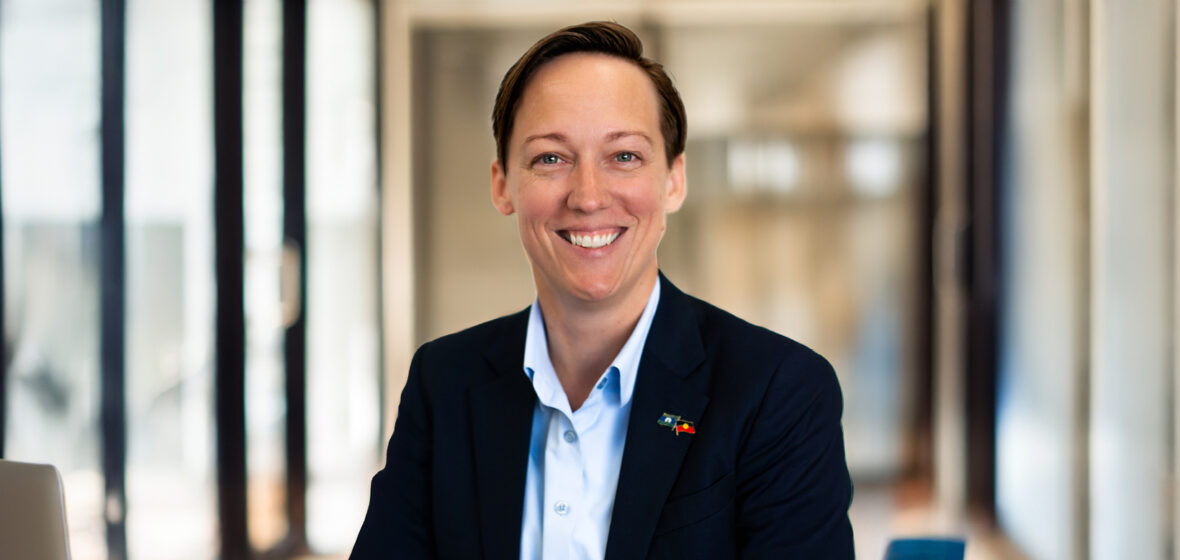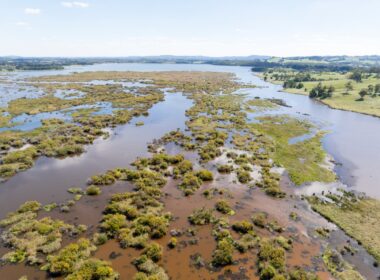Bianca Dufty, a Ngemba and Gamilaraay woman and Associate Director Greater Sydney, Family Law Division at Legal Aid NSW will be moderating a panel at the Specialist Accreditation Conference on “The redefinition of ‘family member’ under the Family Law Act 1975, kinship care, and the impact on First Nations communities.”
Dufty will be joined by the Honourable Judge Elizabeth Boyle, from the Federal Circuit and Family Court of Australia, Louise Coady, Principal Solicitor at the Aboriginal Legal Service (NSW/ACT), and Rachael Ward, Director of Child Law at the NSW Department of Communities and Justice (DCJ).
The Panel will be examining recent changes to the Family Law Act. Dufty points out that there have been major changes for Aboriginal and Torres Strait Islander families, “one of [the changes] being … the definition of relative, which has really expanded the definition of relatives for Aboriginal and Torres Strait Islander people to include … extended family and also our kinship,” she says.
“When we look at kinship for Aboriginal families, section four includes extended family members, [including] aunts, uncles, step siblings [and] step type relationships, but also includes somebody who’s recognised as kin, by way of Aboriginal and Torres Strait Islander culture,” Dufty says.
Dufty points out that another significant change for Aboriginal and Torres Strait Islander families is the change to section 60CC. Under section 60CC(3), the Court must consider a variety of factors including the child’s right to “enjoy the child’s Aboriginal or Torres Strait Islander culture.” The panel will discuss the legislative changes, what it means in terms of the information that is before the Court and how to ensure that the right information is put before the Court.
The panel will also discuss the importance of cultural plans and what that might look like in a FCFCOA setting. “Cultural plans are something that [have] been around for a long time … [the panel will unpack] for the audience what that means … what is a cultural plan? What does it look like? What information does it have? Where might you find that information if you are a practitioner working in this space?” says Dufty.
Another important topic of discussion for the panel will be the Specialist Indigenous Lists (SIL). “We are really fortunate in New South Wales to have five lists now (Sydney, Newcastle, Port Macquarie, Lismore and Coffs Harbour). We have five Specialist Indigenous Lists across the state, which I think is a really positive step in the right direction. …
The Specialised Indigenous Lists are [a] really important puzzle piece from a systems perspective in helping kids maintain their connection to culture,” she says.
Another benefit of the SILs is the access to an Indigenous Family Liaison Officer, also known as a “IFLO.”
“Judge Boyle will be able to speak to the IFLOs role more, but they are really there to help families access the Court system but also to provide some non-legal and social support, so it will be of benefit for practitioners to know and understand the role of the IFLOS. So, keen to talk about that,” says Dufty.
Connection to culture
A Ngemba and Gamilaraay woman, Dufty is passionate about retaining a connection to culture. “For me, as an Aboriginal person, we talk about … the importance of culture for children because it’s a strength. As Aboriginal people, our culture, our language, our ways of knowing, being and doing are a real strength for us,” she says.
When assessing the impact that separation might have on children, Dufty says “the ability for an Aboriginal and Torres Strait Islander child to be able to have access, in a meaningful way, to their culture, means that they will find strength in that culture. They will find a place of belonging that will ultimately help them deal with that separation. …
“… I think it’s really kind of putting at the forefront of the minds of everybody … the importance of culture for Aboriginal and Torres Strait Islander kids.”
There is a long history and a variety of reasons children might feel disconnected from their Aboriginal and Torres Strait Islander culture. Dufty acknowledges the sense of dispossession; the effect assimilation policies and Stolen Generations have had on people’s connection to their culture.
“If we are able to play a part in somebody reconnecting to their culture and finding a strength in that, particularly when it comes to children, we absolutely should do all we can as a family law system to be able to facilitate that,” she says.
The role the Aboriginal Legal Service and DCJ plays are also fundamental to the process. In terms of how various organisations, including Legal Aid, can come together and work together to achieve the goal, Dufty says that “If we look at Closing the Gap, at Target 12 which is around reducing the rate of Aboriginal kids in out of home care, I think there’s a real sense of everybody acknowledging that we need to work together if we want to see more kids remain connected to the family and their culture.”
“It gives me hope, as an Aboriginal person whose family has been touched by Stolen Generations, that we will start to see change,” she says.
Inspiration to pursue law
Dufty established the Family Law Service for Aboriginal Communities at Legal Aid. Before pivoting to a career in law, she describes herself as a “career public servant” who worked in the Federal Government. In her mid-twenties, Dufty reached a point where she wanted to make a difference. “I felt like as an Aboriginal person, I need to be doing something that is impactful in the lives of other Aboriginal and Torres Strait Islander people if that’s something that I can do,” she says.
Dufty acknowledges the role her grandmother Lizzie played in her decision to pursue law and how her grandmother has guided her in the work that she does. Dufty’s grandmother Lizzie was two years old when she was taken from her family, along with her five other sisters, and she was placed in Singleton girls home. Dufty says “in that moment, I thought, I have to do this … this is not ok. The trauma that she must have experienced as a two-year-old and to then not be reconnected to her siblings … to have her wages stolen, for me, it kind of just felt like this is what I have to do.
“I feel very strongly about making sure that Aboriginal and Torres Strait Islander kids are safe, and they remain connected to their culture. I have been doing this for almost ten years now. I continue to be just as passionate as I was sitting there reading those documents from Aboriginal affairs about Nan Lizzie being taken from her family and her wages being stolen, as I am now.”
Dufty’s own experiences have helped her understand and appreciate why it is important for Aboriginal children to know who their family is and for them to be involved in a meaningful way.
She stresses the importance of ensuring that children retain their connection to kinship, culture, language and community as much as they can. “Nan Lizzie set me on this path, and she has plotted the path forward for me so I will continue to walk her footsteps and she’ll continue to uplift me in the work that I do,” she says.
The Specialist Accreditation Conference 2024 will be held on 15 – 16 August 2024. Day one of the conference will be held at the International Convention Centre in Sydney and day two will take place online. Information about sessions and presenters can be found here.




